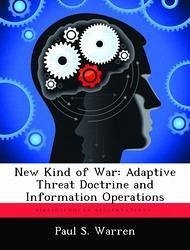The United States military remains the dominant post-modern state combatant. Military actions in Kosovo, Bosnia, and the Desert Storm victory validated the theory that information-based technologies are decisive factors in modern military operations. Threats recognize that peer competitors of the U.S. do not exist and are several decades away from developing similar military technologies. Consequently, threat-based strategies seek alternative or asymmetrical methods of warfare designed to exploit U.S. weaknesses and disrupt or paralyze the decision-making apparatus. Information operations provide opportunities to avoid direct contact with superior conventional forces and threat capabilities enhanced where qualitative gaps with opposing forces exist. The theoretical framework for the study is a model of information warfare that draws a distinction between "cyberwar" and "netwar" two components of information warfare that are structurally different. Using a hybrid of this model, the effectiveness of threat strategy using "netwar" to disrupt the decision-making process and create paralysis at the strategic and operational level can be determined. Understanding how the threat is adapting to knowledge-based warfare and U.S. military information dominance is vital to U.S. national interests. What methods are state and non-state actors using to counter U.S. technological superiority? Can adaptive threat applications be developed that cause strategic and operational paralysis? If so, then are they successful in achieving threat end-states and are they designed to use information operations to gain a relative advantage? Can it be shown that future threats to the security of the United States can develop new ways, specifically "netwar" strategies, to attack and exploit U.S. military weaknesses? Conclusively, threats to the security of the United States and her allies might achieve the operational and strategic paralysis of U.S. and allied military forces through "netwar stra
Hinweis: Dieser Artikel kann nur an eine deutsche Lieferadresse ausgeliefert werden.
Hinweis: Dieser Artikel kann nur an eine deutsche Lieferadresse ausgeliefert werden.








